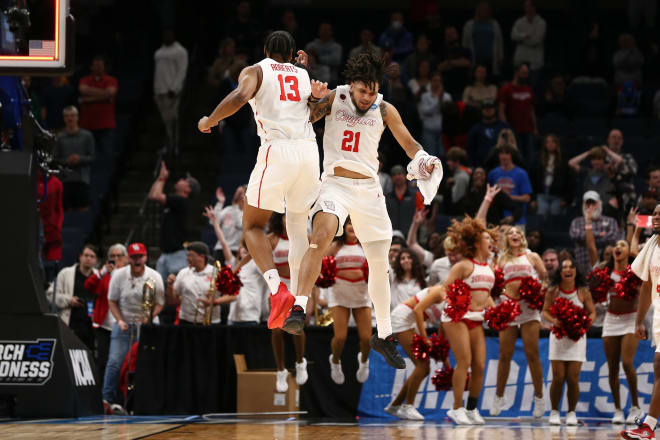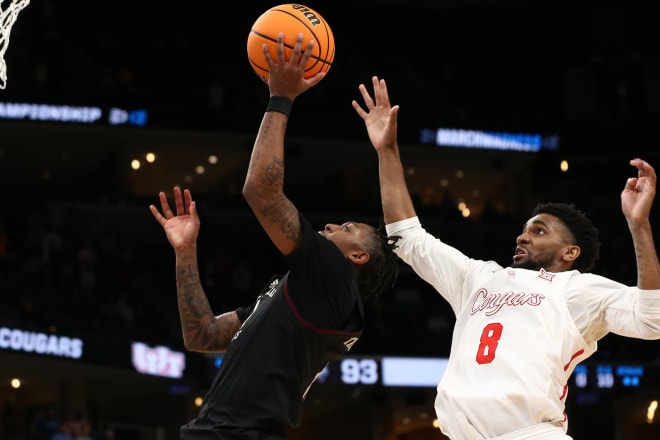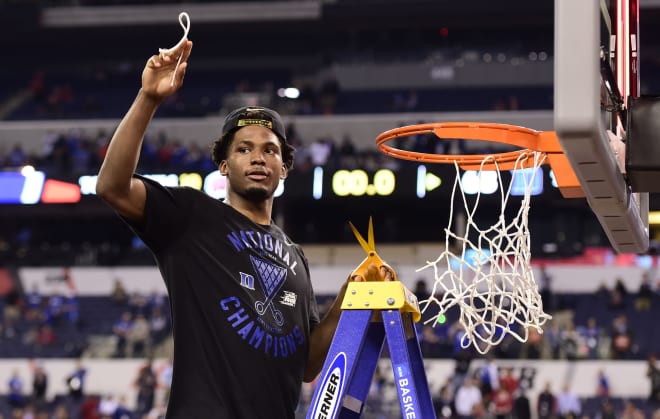5 things to know about Houston
Duke takes on Cougars in Sweet 16 matchup

Houston lost four games this season and at one point in early January, was under .500 in its first season in the Big 12.
Sure, starting 1-2 in an 18-game league slate isn’t the end of the season. It obviously wasn’t for Houston, which only lost one more game in the Big 12 and won the league’s regular-season title by two games.
The Cougars have become a powerhouse under coach Kelvin Sampson. Their combined record over the last three seasons is 97-14, and staying consistent with the move from the AAC to the Big 12 this year proves wrong some doubters. This three-year surge comes on the heels of a Final Four run in the 2021 NCAA tournament, the program’s first since the Phi Slamma Jamma teams of the 1980s.
On Friday night in Dallas, Duke will face a staunch defensive team that makes you miss shots — but also one that’s scored 186 points in the NCAA tournament so far.
Here are five things to know about Houston ahead of Friday night’s game.
1. The big D
Green is good on KenPom, and Houston has a whole lot of green on its defensive numbers.
The Cougars rank in the top 10 nationally in seven of the 10 defensive metrics. Those are: effective field goal percentage, turnover percentage, 3-point defense, 2-point defense, free-throw rate, block rate and steal rate.
(Including free-throw defense is a nice add-on that doesn’t mean much.)
It all adds up to Houston being second in the country in defensive efficiency, allowing opponents to score 0.88 points per possession. Creating turnovers is the part that jumps off the page because getting easy offense in transition is how a team that doesn’t have the most-talented scorers still ranks 14th in offensive efficiency.
Here’s where you wonder: How did Texas A&M just score 95 points against them in Sunday night’s overtime loss?
We’ll get to that.

2. Where you can score
Two of those 10 defensive categories that don’t rank in the top 10 nationally are glaring weaknesses for Houston.
Texas A&M took advantage of both and almost knocked out the Cougars.
Houston allows offensive rebounds on 31% of its opponents’ misses, which is 273rd in the country. The Aggies had 26 offensive rebounds for 26 second-chance points in the second-round game. In regular-season losses to TCU (36.8%) and Kansas (35.3%), the Cougars also gave up big offensive rebound numbers.
That’s significant for the matchup against Duke, given the Blue Devils had 12 offensive rebounds against James Madison on Sunday.
The other problematic area for Houston has been putting its opponent on the free-throw line.
Other teams’ field-goal attempt/free-throw attempt rate is 39.8% against Houston. Essentially, for every five shots you take against Houston, you’ll have two free throws. Texas A&M was 29-for-45 on Sunday night.
3. Taken to the Shead
Houston has a guard trio that does the heavy lifting for its offense, led by Jamal Shead.
The 6-1, 200-pounder is a fourth-year player who played sparingly for Houston’s team that reached the Final Four three seasons ago. After the bulk of that team left, he’s been the Cougars’ top distributor for the last three seasons.
Shead is second on the team in scoring (13.2) and has nearly half of Houston’s assists this season. He averages 6.4; he’s had 230 assists and the rest of the team has combined for 244.
Houston’s leading scorer is also someone who played spot minutes for a team in the 2021 Final Four. LJ Cryer spent three seasons at Baylor and was a freshman for the Bears’ national championship season. In his first season at Houston, the Katy, Texas native averages 15.5 points and is a 38.8% 3-point shooter, taking 7.9 3s per game.
Rounding out the guard trio is Emanuel Sharp, a sophomore coming off a career-high 30 points against Texas A&M. He’s a 37.1% 3-point shooter and drilled seven 3s against the Aggies (on 14 attempts).
4. Kelvin Sampson’s rebirth
On Houston’s website, the bio page for Sampson has a ton of information on his 10 seasons with the Cougars — that’s a given.
It glosses over his six seasons as an NBA assistant that preceded the past decade, spent with the Bucks and Rockets. That’s to be expected, too, since he was an assistant coach outside of the college ranks.
The previous college description is … intriguing.
There are 584 words detailing Sampson’s 12 seasons at Oklahoma, during which he won the Big 12 three straight seasons and reached a Final Four. There are 182 words on his time at Washington State, a seven-year stop that never saw him make the NCAA tournament but did have two 20-win seasons at a place where winning is hard to come by.
And there are the Indiana years. Two of them, in between Oklahoma and the NBA, both of them 20-win seasons with NCAA tournament berths.
All of 64 words to describe them.
Sampson was forced to resign in late February of his second season with the Hoosiers because of NCAA violations. The crimes against college athletics’ governing body stemmed from text messages sent during a dead period, and he was given a five-year show-cause penalty — hence the NBA years — as a result.
Bringing Houston back to national relevance and lessening restrictions on phone contact between coaches and recruits has brought Sampson’s public image all the way back to favorable. The Pembroke, N.C. native is 68 and seems like he’s in the peak of his career.

5. History with Houston
Well … there isn’t any.
Duke and Houston have never played. Maybe that shouldn’t be too surprising, given the different regions and that they’ve obviously never shared the same conference.
But it’s interesting that Houston’s rise and fade to power, making three straight Final Fours and twice losing in the national championship between 1982-84, came on the edge of Duke’s rise as a national power.
Duke is familiar with recruiting the Houston area, though. Justise Winslow and Rasheed Sulaimon immediately come to mind as Blue Devils’ recruiting wins from Houston. Given DeSoto is a suburb of Dallas, it’s worth mentioning the Blue Devils also scored Matt Jones and Marques Bolden from nearby where this weekend’s games will be played.
